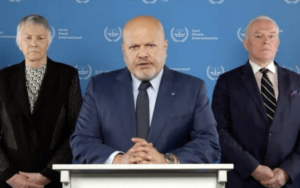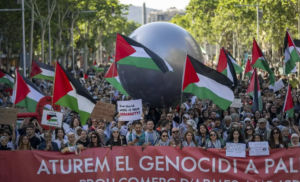In the film archive of The Associated Press there are 2.47 minutes of shaky footage dated 10th July 1972. The colour of the stock is crude, the quality grainy. The clip is disorientating, the camera continually moving as if searching for meaning. It’s an eerily silent piece of newsreel. With the absence of a long shot there’s little sense of location. You need to know the context to understand what you are watching. On YouTube the clip is entitled, ‘Ghassan Kanafani killed by a car bomb.’ The footage focuses on details: the legs of the members of a small crowd, a hubcap, a mangled door. There’s a small, blasted hole in the ground near the stained and pockmarked walls of a garage. Together, these details amount to the wreckage of an assassination. Or if you prefer, a targeted killing.
Next month sees the fiftieth anniversary of the killing of Palestinian novelist and intellectual Ghassan Kanafani in Beirut in July 1972. Kanafani was perhaps the most significant Palestinian writer of the 20th century. His death was attributed to the Mossad and the anniversary of it is worth reflecting upon in the light of a continuing resort to the policy of assassination by the State of Israel.
Kanafani was a spokesman for the Popular Front for the Liberation of Palestine and his assassination was said to be in response to the killing of 26 people at Lod Airport in Israel in 1972 by members of the Japanese Red Army. The PFLP was linked to the massacre and therefore from Israel’s point of view, Kanafani became a legitimate target for the ultimate act of censorship.
Kanafani was 36 years old at the time. His niece Lamees, for whom he had composed children’s stories and poems, died with him when a bomb attached to his car outside his home exploded after he turned the ignition key. His wife recalled, ‘we found Lamees a few metres away, Ghassan wasn’t there. I called his name – then I discovered his left leg.’
Like his characters, Kanafani’s story is one of exile. A refugee at 12, in the wake of the Nakba his family left Acre in the north of Palestine for Lebanon. He later attended university at Damascus. After a period in Kuwait, he left for Beirut in 1960 where he performed various editing and writing roles and produced his most notable works. In 1967 he became one of the founders of the PFLP, editing the Front’s magazine and becoming an official spokesman. An obituary at the time described him as ‘a commando who never fired a gun.’
Last month’s shooting in Iran of a colonel in the Revolutionary Guards at the hands of gunmen on motorbikes illustrates that Israel continues to pursue a policy of extraterritorial assassination. There’s a long history of the use of ‘targeted killings’ of the perceived enemies of Zionism stretching back to the British Mandate years. As Palestinian historian Rashid Khalidi and others have argued, many of these killings have had little to do with security or military considerations. There are different uses for assassination such as the need to appease domestic opinion, to garner votes, to deter, to enact revenge or to weaken Palestinian leadership. Khalidi has suggested that Kanafani was targeted precisely because of his ability to articulate the Palestinian cause.
Kanafani can be seen as a symbol of the continuing effort to suppress the Palestinian voice, whether through moves to make the Palestinian flag illegal, the outlawing of Palestinian NGOs or the killing of Al Jazeera journalist Shireen Abu Akleh. And the silencing has continued in specific relation to Kanafani in the years since his assassination with the removal by Israeli authorities of a memorial in his birthplace, Acre in 2018.
There is a danger with Kanafani, as a figurehead for resistance literature, that he can be mythologised through notions of martyrdom or presented as a reductive icon, a romanticized poster boy for the Palestinian revolution (his face – rather absurdly – adorning the likes of tea towels).
We should let the literature speak for the silenced man. The novella Men in the Sun (1962) radically conveys a critical honesty about the alienation, despair, and powerlessness of exile, and exposes the indifference of Gulf state capitalism to Palestinian suffering (making it a particularly apposite read in the era of the Abraham Accords). A stylist and experimenter in form, Kanafani did not deal in a crude didacticism which excludes consideration of the other. There is an extraordinary act of empathy which frames the call to resistance in his other major work, Returning to Haifa (1970). Kanafani’s presentation of the Israeli character Miriam, a holocaust survivor, represents an engagement with the enemy based on an acknowledgement of suffering on both sides. The novella’s humanity inspired an indirect dialogue with Israeli writers such as Sami Michael and Boaz Gaon.
Kanafani’s name is only one on a long list of people assassinated by the Jewish state. ‘The State of Israel is very strong,’ Defense Minister Benny Gantz felt the need to assert in the aftermath of last month’s ‘targeted killing’, part of a notable recent history of Israeli operations inside Iran. Putting questions of morality to one side, this seems to be less a sign of strength than of a harmful addiction to a quick fix, a solution which plays well in the local media. The revealing public debate within Israel in the last few weeks about whether to assassinate the leader of Hamas in Gaza seems to confirm this. In the sphere of public discourse in Israel, assassination has been normalised.
Israel’s addiction to this quick fix, to a ‘rise and kill first’ philosophy, may satisfy a biblical relish for revenge in an increasingly fundamentalist section of the population that sees the Bible as a handbook for living. More simply, it allows a government to be seen to be doing something by the domestic constituency. Assassination is also ultimately a way of muzzling the oppositional voice. The killing of Ghassan Kanafani was both an act of revenge for the terrible violence of Lod and an act of silencing aimed at a prominent and articulate public intellectual.
Except, Kanafani is not silent; his work remains. His legacy still has much to tell us about exile and the more nuanced aspects of the Palestinian experience. He is to be read not only for his critical honesty and his expression of resistance but also for his moral perspective. As the character Said warns in Returning to Haifa – the greatest crime any human can commit is to believe ‘that the weaknesses and mistakes of others give him the right to exist at their expense and justify his own mistakes and crimes.’
(Anthony Fulton is a writer and blogger based in Israel-Palestine. He has contributed to Dissident Voice, CounterPoint, Anti-War.com, The Times of Israel, Countercurrents, Mondoweiss and other media. Courtesy: Countercurrents.org.)




